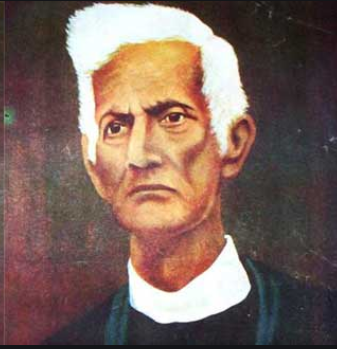Byasakabi Fakir Mohan Senapati
Died :- 14-Jun-1918
Place of Birth :- Mallikashapur, Baleswara

Fakir Mohan Senapati, First in many aspects in modern Odia literature and known as the father of Odia nationalism as also the father of Odia prose fiction, blew new life into Odia language and literature in an environment of gloom and despair when the language was about to lose its entity as a result of conspiracy by some Bengali hegemonists. His sense of humour and sarcasm remain nonpareil in Odia literature. Discarding romantic themes, Fakir Mohan was a social reformer and wrote about the common man and his problems, exploitation of the landless peasants by zamindars and their henchmen, illiteracy and ignorance of the people. He could rightly be compared with great novelists of the 20th Century like Premchand and Bibhutibhusan Banerjee. Even though he had no formal education, he proved to be an enlightened teacher, painter and a great administrator. In his writings, Odia Nationalism was the dominant theme.
Fakir Mohan was born to Lakhmana Charana Senapati and Tulasi Devi Senapati in a middle class family of Malikaspur in Balasore district.. When he was one-and-half year old his father died. After fourteen months his mother also died. Since childhood he was taken care of by his grandmother.
Fakir Mohan's uncle was jealous of young Fakir Mohan and did not allow his education. His weak health also contributed to him being a late learner. He paid towards his educational expenses by working as a child labourer.
Fakir Mohan dedicated his life to the progress of Odia language in the later 19th and early 20th century. He is called the father of Odia fiction.
Mayadhar Mansingh had described Senapati as the Thomas Hardy of Odisha. Though he translated from Sanskrit, wrote poetry, and attempted many forms of literature, he is now known primarily as the father of modern Odia prose fiction. His four novels, written between 1897 and 1915, reflect the socio-cultural conditions of Odisha during the eighteenth and the nineteenth centuries. While the three novels, Chha maana Atha Guntha, Mamu and Prayaschita explore the realities of social life in its multiple dimensions, 'Lachhama' is a historical romance dealing with the anarchical conditions of Odisha in the wake of Maratha invasions during the eighteenth century. Chha Maana Atha Guntha is the first Indian novel to deal with the exploitations of landless peasants by the feudal Lord. It was written much before the October revolution of Russia and much before the entry of Marxist ideas in India. Fakir Mohan is also the writer of the first autobiography in Odia, ‘Atma Jeebana Charita’.
His ‘Rebati’ (1898) is widely recognised as the first Odia short story. His other stories are "Patent Medicine", "Daka Munshi", "Adharma Bitta" etc. His short stories are compiled in books ‘Galpa Swalpa-1 and 2’.
He wrote a long poem, Utkala Bhramana, which, in reality, is not a travelogue but a satire on the state of affairs in Odisha in those times.
Books
Poetry
Poems
Novels
Story
Audio story
- Rebati
- Aja Nati Katha
- Baleswari Panga Luna
- Baleswari Rahajani
- Dakamunsi
- Dhuliababa (Part-1)
- Dhuliababa (Part-2)
- Garudi Mantra (Part-1)
- Garudi Mantra (Part-2)
- Kalika Prasad Gorapa
- Mouna Mouni (Part-1)
- Mouna Mouni (Part-2)
- Randipua Ananta (Part-1)
- Randipua Ananta (Part-2)
- Randipua Ananta (Part-3)
- Sabhya Jamidar
Copyright © 2024 Odia Virtual Academy. All rights reserved Total Visitors- 1
Powered by: Odia Virtual Academy

